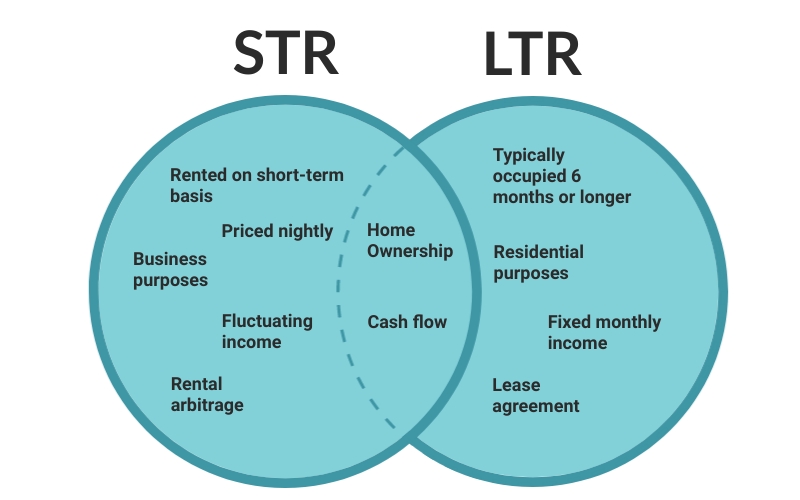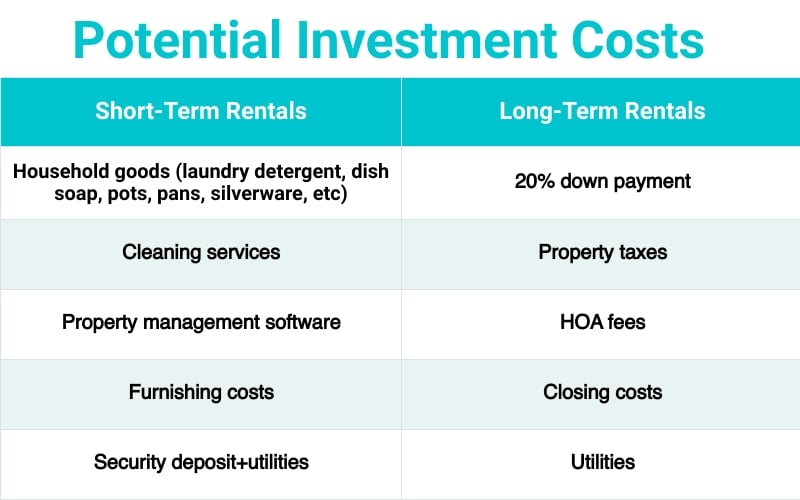As a first-time property investor, you are bound to run into the classic dilemma: short-term or long-term rentals. This issue is not just about how long to rent out your properties for, but also an issue of owning vs. renting property. Traditionally, owning real estate is the ultimate goal for property investors, but ownership has become less common over the years.
Building your real estate portfolio or property management business is now more achievable through short-term rental options that can also bring you passive income and reliable cash flow. The differences between the two types of rental properties should not be overlooked; take some time to understand which type is tailored best to your business goals and objectives.
For some investors, the end goal is solely focused on turning a profit, but for others, managing a property business is about enjoying a side hustle.
First, let’s take a more detailed look at the definition of each rental type.
Table of Contents
Short-Term or Long-Term Rentals: What is the difference?
A short-term rental is typically a vacation rental property that is rented out on a short-term basis to guests in a similar fashion to hotels. However, this type of rental allows the guests to feel more comfortable and “at-home” because these properties are typically furnished like so.
One popular cash flow model used for this type of rental is rental arbitrage, which is essentially renting out a property or apartment unit and then re-renting it out on a short-term basis on vacation rental platforms like Airbnb, VRBO, or HomeAway. This type of rental business is quite common among entrepreneurs who would rather avoid the complexities involved in becoming a property owner (background check, loan approvals, credit check, etc).
On the other hand, a long-term rental is the traditional type of rental property that is typically used for residential purposes. This rental property type is usually protected by a lease agreement of at least 6 months or more with more binding terms than a short-term rental would. Many homeowners choose to rent out their properties to tenants at a higher price than their mortgage to bring in stable, monthly income that remains consistent regardless of the economic conditions. Most people are usually more familiar with this type of rental property as it is more traditional and widely-known.

Now that we understand the definition of both vacation rentals and long-term rental properties, let’s dive into each aspect of rental properties that outlines both the benefits and downsides of a short-term or long-term rental.
Profitability
The end goal of every business is to turn a profit. With both vacation rentals and long-term rentals, there is no doubt that both types provide a lucrative stream of monthly income. The question is: Are short-term or long-term rentals more profitable?
The short answer is that short-term rentals have the potential to earn more cash flow (2x to 5x) each month.
Here is why:
Many short-term rental business owners opt to use the rental arbitrage business model in which property investors can pick up multiple properties with rental leases instead of buying properties that require binding mortgages.
This process of serial renting allows for a fast-scaling business. Also, the investment costs of doing rental arbitrage for vacation rentals vs. long-term rental costs are much smaller. Short-term rentals require security deposits for the lease, furnishing costs, and monthly rent plus utilities, which might amount to a couple of thousand dollars.
However, running a short-term vs. long-term rental means your monthly budget will include replacing furniture, sheets, cleaning fees/supplies, property management software fees, unexpected guest damages, soap, toiletries, and more.
Vacation rentals can be even more equipped with household goods than hotels are with pots, pans, dish soap, laundry detergent, and just about anything you can think of that a regular home has.
In the name of convenience and homeliness, there is a cost associated with all these extra, special touches. However, these small details are worth the cost even if they add up because your monthly profit should surpass your expenses if your vacation rental is managed properly.

Long-term rentals, on the other hand, may require a 20% down payment, property taxes, HOA fees, and utilities. The initial investment for long-term rentals can be tens of thousands of dollars more expensive than short-term rentals (acquired by rental arbitrage). Also, owning a long-term rental property may require a whole year or more to regenerate the original investment money amount and buy a second property.
Even if you do own a short-term rental property instead of doing rental arbitrage, short-term rentals can help you easily scale your business into more cash flow each month, thus increasing your opportunity to invest in more properties in the future.
Make sure to do your market research for your niche, target guests, and location in order to maximize your potential profitability from short-term or long-term rentals.
Maintenance and Cleaning
Short-term rentals undergo constant maintenance and cleaning, which ensures the property investor’s ability to maintain the quality of the property on almost a daily basis. Although the cleaning is your responsibility, you have the option to outsource the cleaning duties to a cleaning company or hire a cleaning service so you don’t need to personally clean yourself.
For long-term rentals, on the other hand, maintenance is taken out of your hands and cleaning duties are mostly in the hands of the tenant. You own the property, so the maintenance that you need to do only involves large damages, such as broken A/C or damaged infrastructure.
This lowkey maintenance seems like less upkeep, but residential rentals are more difficult to monitor for cleanliness on a daily basis. You cannot go inside whenever you want without the tenant’s permission and it’s difficult to control how clean the tenant will keep your property.
Background Checks
Whether you decide to do a short-term or long-term rental, the one factor that is important to consider is who your guests or tenants are.
One downside of short-term rentals is that hosts and property owners are not able to screen guests. This aspect of short-term rentals is inevitable. In this business, as with any other business, you will encounter undesirable guests at some point or another.
One weekend you might have wild party guests who damage your property (a host’s worst nightmare), and then have the best guests ever the next weekend. According to Airbnb, they do not routinely perform background checks on its users, although they reserve the right to do so.
Despite not being able to run an official background check on short-term rental guests, here are some questions to ask potential guests before allowing them to reserve your calendar:
- What is the purpose of your trip?
- How many adults and how many children will be staying in the rental?
- Have you stayed with us before or at another vacation rental before?
- Do you smoke or do you have any pets you will be bringing on the trip with you?
These questions should help you make a good judgment on whether or not you would like to rent your property out to a potential guest, without doing an official background check.
Take some time to have a conversation with the potential guests and explain your rules for the stay, such as no smoking, no parties, no more than 6 additional guests (due to COVID-19). Keep in mind that you are not allowed to ask questions that violate discrimination laws involving age, sexual orientation, marital status, pregnancy, disabilities, and more. Your purpose in asking questions is to make a good judgment on a guest’s character, not to discriminate against them.
Fortunately, as a long-term rental property owner, you won’t run into the same problem. Residential rentals allow you the leverage to run proper tenant screening and background checks to make sure that the tenant is reliable and trustworthy. For some property investors, this option may be more preferable.
Commitment
Managing one rental property, let alone an entire portfolio of real estate requires a level of commitment and maintenance that varies depending on the rental property type and how you decide to operate. Vacation rentals are a full-time business commitment; it’s a 24/7 hustle like many hospitality services.
There are several factors to consider when renting out your property on a short-term basis (from every night to every few nights), such as constant maintenance, marketing, management, coordinating maintenance, purchasing supplies, hiring cleaners, and more.
However, short-term rentals are not as financially binding as long-term rentals are if you do rental arbitrage. Instead of being tied down by massive startup costs, property investors have the flexibility to test out new locations and have less commitment to yearly rental leases.
If your short-term rentals are not performing well in a specific location, the worst that will happen is you break the lease, pay the lease extermination fees, and move on to a new location that is more profitable. Mortgages do not allow for this flexibility, but those are the responsibilities that come with property ownership.
Tax purposes
As a business or property owner, filing for taxes can either be daunting or a blessing in disguise. There are different tax advantages as well as disadvantages associated with both vacation rentals and long-term rentals, so here’s a quick overview:
- Short-term rental businesses can receive tax deductions for property decorations, furniture, paint, etc.
- Running an STR through rental arbitrage means no property taxes and no need to insure property appliances
- Long-term rental costs include property taxes and HOA fees
- However, long-term rentals can also receive tax deductions from mortgage interest, depreciation, property taxes, and property repairs
- In some parts of the world, tax rates for LTRs are much higher than STRs
This list of tax considerations for each rental property type is indefinite, so make sure to consult with your accountant and financial advisor about your taxes for rental properties.
Flexibility in Pricing and Occupancy

One huge advantage of short-term rentals over long-term rentals is the flexibility in pricing models and control over your calendar. When pricing your daily rates for a vacation rental, don’t forget to do your market research!
Occupancy rates and average daily rates are not random numbers pulled out of thin air; this data depends on several factors, such as your location, the seasonality, the historical rates, the amenities you provide, the quality of your property, the rent or mortgage of the property each month, and the list goes on.
You have the power to price your property the way you want to, but make sure that your pricing is reasonable and backed by accurate information (and covers your monthly expenses).
With short-term rentals, you also have more control over your calendar. Through direct booking sites, Airbnb, VRBO, or Homeaway, hosts have the flexibility to block off dates whenever they want, meaning they have control over when they want your property to be occupied. If you have family visiting you in town for a holiday, you can block off those specific dates and accommodate your family instead of other guests.
Your dates are at your discretion.
With long-term rental properties, landlords typically charge tenants rent that is around 1% of the home’s value instead of charging per night like with vacation rentals. There isn’t much flexibility in the homeowner’s ability to upcharge based on the number of tenants or rule violations with residential rentals.
Additionally, tenants in long-term rentals usually live in the property for at least 6 months or usually yearly lease contracts.
Regulations
The rise of short-term rentals combined with the increased spread of COVID-19 has caused STR regulations and rules to evolve all around the world. Even before the pandemic, many local communities either banned property investors from STR or required them to obtain STR licenses, permits.
So before you start your short-term rental empire, make sure to research your region or city’s rules and regulations to avoid future headaches.

Nowadays, strict regulations for short-term rentals are becoming more prominent in some regions, especially as COVID-19 continues to damage the travel industry. Some hosts saw a drastic drop in guest occupancy in 2020, while others received bookings from people who were trying to escape hard-hit areas, or who wanted to ride out the isolation in a more comfortable environment.
Some local authorities were not pleased with the influx of out-of-town visitors, which could increase the spread of the virus. This led to even tighter short-term rental restrictions in communities in Northern California, Colorado, and more.
Restrictions are not just from the local government, they can also be from a homeowner’s association. Long-term rentals are also subject to HOA rules and regulations, but there are no restrictive bans or required licenses to operate a long-term rental.
Hospitality vs. Pride of Ownership
Do you prefer running a hospitality business or having pride in owning property while enjoying low maintenance?
The differences between vacation and residential rentals are paramount to your values and personal preferences. With STR, you have the opportunity to meet new people almost every day.
Short-term rentals allow you the opportunity to meet travelers and visitors from all around the world who want a more authentic stay. Running a short-term rental business is about making connections with people around the globe through a shared home, which may serve as an invaluable experience for many property owners.
You may discover a passion for hosting new people and creating long-lasting relationships through your lodging services, or you might realize that you feel the exact opposite. In that case, you can switch over to a long-term rental or outsource the customer service aspects of an STR business to someone else.
Having pride in property ownership may seem more valuable to some property investors than others because there is a myriad of other ways to create passive income with real estate. Additionally, homeownership is not limited to only long-term rentals; short-term rentals are also owned property.
Seasonality vs. Stability
The last aspect of comparing vacation rentals and long-term rentals involves whether or not you prefer some fast-paced, peak months, and some slow months or a stable income that does not fluctuate.
For short-term rentals, there can be several slow, off-months when vacation rentals are not in-season while other months might be jam-packed and fully booked for local events or holidays. This is why many hosts decide to save their revenue for safety income during the slow seasons.
On the contrary, long-term rentals provide a stable stream of income regardless of holidays, slow seasons, or the state of the economy due to the binding nature of residential leases. Some property investors enjoy more peace of mind with this stability and predictability, while others enjoy the unpredictability of the short-term rental industry, like this successful Airbnb host in Dallas, TX.
The short-term rental industry may not be as traditionally “stable” as long-term rentals are, but using data intelligence and accurate information to strengthen your business strategy can help you achieve even more cash flow and stability.
After reviewing the extensive and inexhaustible list of benefits and downfalls of both types, it’s safe to say that short-term rentals have the potential to provide more lucrative cash flow with less investment costs, but with more daily commitment.
Long-term rentals require less daily maintenance, higher investment costs, and a certain sense of stability. Take the time to review your options and decide which rental property type is best suited for your goals and aspirations.
Access accurate data analytics in our interactive dashboard here to understand your target market.



